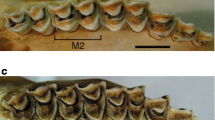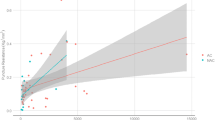Abstract
The olive colobus (Procolobus verus) is the smallest extant colobine. Based on the axiom that folivory is associated with larger body mass, the olive colobus is expected to be less folivorous than its sister taxon Piliocolobus badius, but previous studies show that the opposite is true. Here we test the hypothesis that masticatory and ingestive effort in the olive colobus is greater due to allometric factors related to bite force scaling and throughput of ingested foods. We analyzed oral processing data collected on olive colobus in the Taï Forest, Ivory Coast, between May 2016 and May 2018. We compare these with previously published data on P. badius and Colobus polykomos from Taï. In terms of overall feeding effort, olive colobus invest more effort (i.e., chewing cycles) than the larger colobines. When contrasts are restricted to commonly consumed foods, this greater energetic investment is not consistently observed. Ingestion of young leaves is associated with a reduced number of masticatory cycles in all three colobine species. A slightly elevated average effort in the olive colobus during young leaf feeding suggests this food source is more challenging in smaller monkeys, but mature leaf processing effort is generally the same among Taï colobines. Thus, for olive colobus, leaf ductility may be more problematic than leaf toughness in terms of masticatory effort. While there may be an allometric cost to being a small colobine, food selectivity is an important mitigating factor.

(Photo by W. Scott McGraw)




Similar content being viewed by others
References
Altmann SA (2009) Fallback foods, eclectic omnivores, and the packaging problem. Am J Phys Anthropol 140:615–629. https://doi.org/10.1002/ajpa.21097
Caton JM (1999) Digestive strategy of the Asian colobine genus Trachypithecus. Primates 40:311–325. https://doi.org/10.1007/BF02557555
Chapman CA, Chapman LJ (2002) Foraging challenges of red colobus monkeys: influence of nutrients and secondary compounds. Comp Biochem Physiol A Mol Integr Physiol 133:861–875. https://doi.org/10.1016/S1095-6433(02)00209-X
Chapman CA, Rothman JM, Lambert JE (2012) Food as a selective force in primates. In: Mitani JC, Call J, Kappeler PM et al (eds) The evolution of primate societies. University of Chicago Press, pp 149–168
Clutton-Brock TH, Harvey PH (1977) Primate ecology and social organization. J Zool 183:1–39. https://doi.org/10.1111/j.1469-7998.1977.tb04171.x
Dasilva GL (1994) Diet of Colobus polykomos on Tiwai Island: selection of food in relation to its seasonal abundance and nutritional quality. Int J Primatol 15:655–680. https://doi.org/10.1007/BF02737426
Davies AG, Oates JF, Dasilva GL (1999) Patterns of frugivory in three West African colobine monkeys. Int J Primatol 20:327–357. https://doi.org/10.1023/A:1020596503533
Dechow PC, Carlson DS (1990) Occlusal force and craniofacial biomechanics during growth in rhesus monkeys. Am J Phys Anthropol 83:219–237. https://doi.org/10.1002/ajpa.1330830211
Djego-Djossou S, Wiafe E, Hakizamana D, Mensah GA, Sinsin BA (2019) Comparison of feeding ecology and diet between olive colobus monkey (Procolobus verus) groups in forest fragments and continuous forest, Benin. J Rech Sci Univ Lomé 21:37–46. https://doi.org/10.4314/jrsul.v21i1
Dominy NJ, Lucas PW, Osorio D, Yamashita N (2001) The sensory ecology of primate food perception. Evol Anthropol Issues News Rev 10:171–186. https://doi.org/10.1002/evan.1031
Dunham NT, Lambert AL (2016) The role of leaf toughness on foraging efficiency in Angolan black-and-white colobus monkeys (Colobus angolensis palliatus). Am J Phys Anthropol 161:343–354. https://doi.org/10.1002/ajpa.23036
Galat G, Galat-Luong A (1985) La communauté de primates diurnes de la forêt de Taï, Côte d’Ivoire. Rev Ecol 40:3–32
Garber PA (1987) Foraging strategies among living primates. Annu Rev Anthropol 16:339–364
Gaulin SJC (1979) A Jarman/bell model of primate feeding niches. Hum Ecol 7:1–20
Geissler E, Daegling DJ, Polvadore TA, McGraw WS (2021) Seed choice differs by sex in sooty mangabeys (Cercocebus atys). Primates 62:361–367. https://doi.org/10.1007/s10329-020-00863-w
Groves C (2001) Primate taxonomy. Smithsonian Institution Press, Washington, DC
Harvey PH, Clutton-Brock TH (1981) Primate home-range size and metabolic needs. Behav Ecol Sociobiol 8:151–155. https://doi.org/10.1007/BF00300828
Hill WCO (1952) The external and visceral anatomy of the olive colobus monkey (Procolobus verus). Proc Zool Soc Lond 122:127–186. https://doi.org/10.1111/j.1469-7998.1952.tb06315.x
Hill WCO, Booth AH (1957) Voice and larynx in African and Asiatic Colobidae. J Bombay Nat Hist Soc 54:309–321
Hill DA, Lucas PW (1996) Toughness and fiber content of major leaf foods of Japanese macaques (Macaca fuscata yakui) in Yakushima. Am J Primatol 38:221–231. https://doi.org/10.1002/(SICI)1098-2345(1996)38:3%3c221::AID-AJP3%3e3.0.CO;2-0
Höner OP, Leumann L, Noë R (1997) Dyadic associations of red colobus and Diana monkey groups in the Taï National Park, Ivory Coast. Primates 38:281–291. https://doi.org/10.1007/BF02381615
Janson CH, Boinski S (1992) Morphological and behavioral adaptations for foraging in generalist primates: the case of the cebines. Am J Phys Anthropol 88:483–498. https://doi.org/10.1002/ajpa.1330880405
Janson CH, Goldsmith ML (1995) Predicting group size in primates: foraging costs and predation risks. Behav Ecol 6:326–336. https://doi.org/10.1093/beheco/6.3.326
Kane EE, Traff JN, Daegling DJ, McGraw WS (2020) Oral processing behavior of Diana monkeys (Cercopithecus diana) in Taï National Park, Côte d’Ivoire. Folia Primatol. https://doi.org/10.1159/000508072
Kay R (1984) On the use of anatomical features to infer foraging behavior in extinct primates. In: Rodman P, Cant JG (eds) Adaptations for foraging in nonhuman primates: contributions to an organismal biology of prosimians, monkeys, and apes. Columbia University Press, New York, pp 21–53
Korstjens AH, Noë R (2004) Mating system of an exceptional primate, the olive colobus (Procolobus verus). Am J Primatol 62:261–273. https://doi.org/10.1002/ajp.20020
Korstjens AH, Schippers EP (2003) Dispersal patterns among olive colobus in Taï National Park. Int J Primatol 24:515–539. https://doi.org/10.1023/A:1023784213317
Korstjens AH, Bergman K, Deffernez C, Krebs M, Nijssen EC, van Oirschot BAM, Paukert C, Schippers E (2007) How small-scale differences in food competition lead to different social systems in three closely related sympatric colobines. In: McGraw WS, Zuberbühler K, Noë R (eds) Monkeys of the Taï forest. An African primate community. Cambridge University Press, Cambridge, pp 72–108
Korstjens AH (2001) The mob, the secret sorority, and the phantoms. Dissertation, Utrecht University
Lambert JE (1998) Primate digestion: interactions among anatomy, physiology, and feeding ecology. Evol Anthropol Issues News Rev 7:8–20. https://doi.org/10.1002/(SICI)1520-6505(1998)7:1%3c8::AID-EVAN3%3e3.0.CO;2-C
Leonard WR, Robertson ML (1997) Comparative primate energetics and hominid evolution. Am J Phys Anthropol 102:265–281. https://doi.org/10.1002/(SICI)1096-8644(199702)102:2%3c265::AID-AJPA8%3e3.0.CO;2-X
Lucas PW, Copes L, Constantino PJ, Vogel ER, Chalk J, Talebi M, Landis M, Wagner M (2012) Measuring the toughness of primate foods and its ecological value. Int J Primatol 33:598–610. https://doi.org/10.1007/s10764-011-9540-9
McGraw WS (1998) Comparative locomotion and habitat use of six monkeys in the Taï Forest, Ivory Coast. Am J Phys Anthropol 105:493–510. https://doi.org/10.1002/(SICI)1096-8644(199804)105:4%3c493::AID-AJPA7%3e3.0.CO;2-P
McGraw WS, Daegling DJ (2020) Diet, feeding behavior, and jaw architecture of Taï monkeys: congruence and chaos in the realm of functional morphology. Evol Anthropol Issues News Rev 29:14–28. https://doi.org/10.1002/evan.21799
McGraw WS, Zuberbühler K (2008) Socioecology, predation, and cognition in a community of West African monkeys. Evol Anthropol Issues News Rev 17:254–266. https://doi.org/10.1002/evan.20179
McGraw WS, Vick AE, Daegling DJ (2011) Sex and age differences in the diet and ingestive behaviors of sooty mangabeys (Cercocebus atys) in the Taï Forest, Ivory Coast. Am J Phys Anthropol 144:140–153. https://doi.org/10.1002/ajpa.21402
McGraw WS, van Casteren A, Kane E, Geissler E, Burrows B, Daegling DJ (2016) Feeding and oral processing behaviors of two colobine monkeys in Taï Forest, Ivory Coast. J Hum Evol 98:90–102. https://doi.org/10.1016/j.jhevol.2015.06.001
McKey D, Gartlan JS, Waterman PG, Choo G (1981) Food selection by black colobus monkeys (Colobus satanas) in relation to plant chemistry. Biol J Linn Soc 16:115–146. https://doi.org/10.1111/j.1095-8312.1981.tb01646.x
Milton K (1979) Factors influencing leaf choice by howler monkeys: a test of some hypotheses of food selection by generalist herbivores. Am Nat 114:362–378. https://doi.org/10.1086/283485
Oates JF (1986) Food distribution and foraging behavior. In: Smuts BB, Cheney DL, Seyfarth RM, Wrangham RW (eds) Primate societies. University of Chicago Press, pp 197–209
Oates JF (1988) The diet of the olive colobus monkey, Procolobus verus, in Sierra Leone. Int J Primatol 9:457–478. https://doi.org/10.1007/BF02736220
Oates JF, Whitesides GH (1990) Association between olive colobus (Procolobus verus), Diana guenons (Cercopithecus diana), and other forest monkeys in Sierra Leone. Am J Primatol 21:129–146. https://doi.org/10.1002/ajp.1350210206
Robbins MM, McNeilage A (2003) Home range and frugivory patterns of mountain gorillas in Bwindi Impenetrable National Park, Uganda. Int J Primatol 24:467–491. https://doi.org/10.1023/A:1023741328338
Ross CF, Washington RL, Eckhardt A, Reed DA, Vogel ER, Dominy NJ, Machanda ZP (2009) Ecological consequences of scaling of chew cycle duration and daily feeding time in primates. J Hum Evol 56:570–585. https://doi.org/10.1016/j.jhevol.2009.02.007
Ross CF, Iriarte-Diaz J, Nunn CL (2012) Innovative approaches to the relationship between diet and mandibular morphology in primates. Int J Primatol 33:632–660. https://doi.org/10.1007/s10764-012-9599-y
Schultz AH (1958) Cranial and dental variability in colobus monkeys. Proc Zool Soc Lond 130:79–105. https://doi.org/10.1111/j.1096-3642.1958.tb00564.x
Sterck EHM, Watts DP, van Schaik CP (1997) The evolution of female social relationships in nonhuman primates. Behav Ecol Sociobiol 41:291–309. https://doi.org/10.1007/s002650050390
Strasser E, Delson E (1987) Cladistic analysis of cercopithecid relationships. J Hum Evol 16:81–99. https://doi.org/10.1016/0047-2484(87)90061-3
Struhsaker TT (1980) Comparison of the behaviour and ecology of red colobus and redtail monkeys in the Kibale Forest, Uganda. Afr J Ecol 18:33–51. https://doi.org/10.1111/j.1365-2028.1980.tb00269.x
Struhsaker TT, Leland L (1986) Colobines: infanticide by adult males. In: Smuts BB, Cheney DL, Seyfarth RM, Wrangham RW (eds) Primate societies. University of Chicago Press, pp 83–97
Terborgh J (1983) Five New World primates: a Study in comparative ecology. Princeton University Press, Princeton, NJ
Ting N (2008) Mitochondrial relationships and divergence dates of the African colobines: evidence of Miocene origins for the living colobus monkeys. J Hum Evol 55:312–325. https://doi.org/10.1016/j.jhevol.2008.02.011
Traff J, Daegling DJ (2021) What does ‘toughness’ look like? An examination of the breakdown of young and mature leaves under cyclical loading. Interface Focus 11:20200087. https://doi.org/10.1098/rsfs.2020.0087
Ungar PS (1994) Patterns of ingestive behavior and anterior tooth use differences in sympatric anthropoid primates. Am J Phys Anthropol 95:197–219. https://doi.org/10.1002/ajpa.1330950207
Venkataraman VV, Glowacka H, Fritz J, Clauss M, Seyoum C, Nguyen N, Fashing PJ (2014) Effects of dietary fracture toughness and dental wear on chewing efficiency in geladas (Theropithecus gelada). Am J Phys Anthropol 155:17–32. https://doi.org/10.1002/ajpa.22571
Wachter B, Schabel M, Noë R (1997) Diet overlap and polyspecific associations of red colobus and Diana monkeys in the Taï National Park, Ivory Coast. Ethology 103:514–526. https://doi.org/10.1111/j.1439-0310.1997.tb00164.x
Wheatley BP (1982) Energetics of foraging in Macaca fascicularis and Pongo pygmaeus and a selective advantage of large body size in the orang-utan. Primates 23:348–363. https://doi.org/10.1007/BF02381319
Wrangham RW (1980) An ecological model of female-bonded primate groups. Behaviour 75:262–300
Wright W, Vincent JFV (1996) Herbivory and the mechanics of fracture in plants. Biol Rev 71:401–413. https://doi.org/10.1111/j.1469-185X.1996.tb01280.x
Wright BW, Ulibarri L, O’Brien J, Sadler B, Prodhan R, Covert HH, Nadler T (2008) It’s tough out there: variation in the toughness of ingested leaves and feeding behavior among four Colobinae in Vietnam. Int J Primatol 29:1455–1466. https://doi.org/10.1007/s10764-008-9294-1
Yamashita N (2003) Food procurement and tooth use in two sympatric lemur species. Am J Phys Anthropol 121:125–133. https://doi.org/10.1002/ajpa.10206
Acknowledgements
Many thanks to John Oates and Mandy Korstjens for their helpful comments. We thank the dedicated assistants of the Taï Monkey Project, particularly Ferdinand Bele, and the project liaison, Dr. Anderson Bitty, for their invaluable efforts. For logistical support during all phases of the field project, we thank the Centre Suisse de Recherche Scientifique and its director, Dr. Inza Kone. Permission to work in the Taï Forest, Ivory Coast, was granted by the Ministère de l'Enseignement Supérieur et de la Recherche Scientifique, Direction Générale de la Recherche Scientifique et de l'Innovation Technologie, and the Ministère de l'Environnement, des Eaux et Forêts, Office Ivoirien de Parcs et Réserves. This study was supported by the National Science Foundation (BCS 0840110, 0921770, and 0922429).
Author information
Authors and Affiliations
Corresponding author
Additional information
Publisher's Note
Springer Nature remains neutral with regard to jurisdictional claims in published maps and institutional affiliations.
About this article
Cite this article
Traff, J.N., McGraw, W.S. & Daegling, D.J. Masticatory and ingestive effort in Procolobus verus, a small-bodied African colobine. Primates 63, 271–282 (2022). https://doi.org/10.1007/s10329-022-00978-2
Received:
Accepted:
Published:
Issue Date:
DOI: https://doi.org/10.1007/s10329-022-00978-2




